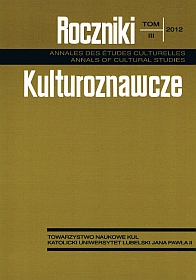Is the Crisis in the Arts?
Abstract
In the article the author takes the following topics: first, he adjudges whether the issue is really taken a functional problem, or maybe a pseudo-problem. He notes that, although the present day culture is assimilated with modern art, specifically speaking, the so-called. anti-art is still many theorist accused her betraying the ethos of art and destructive impact on the culture. Moreover, the author points out that anti-art is the cause of social conflicts. Her achievements since violate elementary — cognitive, moral and religious — the criteria of cultural discourse, and yet art is not an isolated, autonomous and autotelic area, but organically related to all spheres of culture. The author adds that the knowledge of philosophical and civilisational context is a necessary issue in the debate on the arts. Second, the author answers the question, what is a crisis. He draws attention to the etymology of the word, according to which (gr. krisis), it means either a sudden change in the course of things, the collapse of something, and the moment of decision is something that turn (from gr. krinein), is a state of existential undesirable that storm in a specific area of the balance of reality and thus undermine its purpose and rationality. Thirdly, the author briefly presents the positions taken by the artists and scholars in a discussion of the crisis in the arts. Then, fourthly, the author considers the place of the arts in culture and civilization. He touches the problem of modernism and postmodernism following it. Fifth, he answers the question of whether and how philosophy lies at the root of this crisis in the arts. Finally, the sixth, the author addresses the problem of idealism and its repercussions in the field of philosophy. In conclusion, the author notes that to really understand the problem of art, one cannot ignore the context of philosophy, without which any discussion of the art significantly alter its understanding and consequently lead to a crisis not only in terms of understanding the culture, but above the understanding of human being.
References
Duda-Gracz J.: Rozważania na przełomie wieków, czyli o konieczności wyboru sztuki między dyktaturą babuni a niepodległością peryferii. „Cywilizacja” 2004 nr 11 s. 45-53.
Dziamski G.: Postmodernizm wobec kryzysu estetyki współczesnej. Poznań: Wydawnictwo Naukowe UAM 1996.
Jaroszyński P.: Spór o piękno. Poznań: Fonopol 1992.
Kiereś H.: Co się dzieje z estetyką? „Roczniki Filozoficzne” 50:2002 z. 1 s. 333-343.
Kiereś H.: Co zagraża sztuce? Lublin: Fundacja Servire Veritati Instytut Edukacji Narodowej 2004.
Kiereś H.: Człowiek i sztuka. Lublin: Polskie Towarzystwo Tomasza z Akwinu 2006.
Kiereś H.: Kryzys w sztuce. W: tenże. Sztuka wobec natury. Warszawa: Gutenberg-Print 1997 s. 9-29; wyd. 2, poprawione i poszerzone: Warszawa: Polskie Wydawnictwo Encyklopedyczne 2001.
Kiereś H.: Spór o sztukę. Lublin: Redakcja Wydawnictw KUL 1996.
Kiereś H.: Spór o teorię sztuki. W: Służyć kulturze. Lublin: Fundacja Servire Veritati Instytut Edukacji Narodowej 1998 s. 127-144.
Kiereś H.: Trzy socjalizmy. Tradycja łacińska wobec modernizmu i postmodernizmu. Lublin: Lubelska Szkoła Filozofii Chrześcijańskiej 2000.
Krakowski P.: O sztuce nowej i najnowszej. Warszawa: Państwowe Wydawnictwo Naukowe 1981.
Krąpiec M. A.: Filozofia – co wyjaśnia? Warszawa: Gutenberg-Print 1997.
Kryzys. W: Powszechna Encyklopedia Filozofii. T. 6: K-M. Lublin: Polskie Towarzystwo Tomasza z Akwinu 2005.
Najnowsze tendencje badawcze w estetyce [dyskusja panelowa]. W: Panorama współczesnej filozofii polskiej. Red. J. Jadacki. Warszawa: Semper 2010 s. 232-238.
Postmodernizm. W: Powszechna Encyklopedia Filozofii. T. 8: P-S. Lublin: Polskie Towarzystwo Tomasza z Akwinu 2007 s. 387-391.
Przemiany współczesnej świadomości artystycznej. W: Wokół postmodernizmu. Red. T. Szkołut. Lublin: Wydawnictwo Uniwersytetu Marii Curie-Skłodowskiej 1992.
Sacrum i profanum a współczesna kultura. Materiały z konferencji zorganizowanej przez Komisję Kultury i Środków Przekazu pod patronatem Marszałka Senatu RP Bogdana Borusewicza 25 kwietnia 2006 r. Opr. M. Lipińska. Warszawa: Biuro Administracyjne Dział Wydawniczy 2006.
Silvers A.: Aesthetic for Art’s Sake, Not for Philosophy’s! „The Journal of Aesthetics and Art Criticism” 51:1993 s. 141-150.
Tatarkiewicz W.: Klasyczne a nowoczesne rozumienie sztuki. W: tenże. Droga przez estetykę. Warszawa: Państwowe Wydawnictwo Naukowe 1972 s. 288-294.





